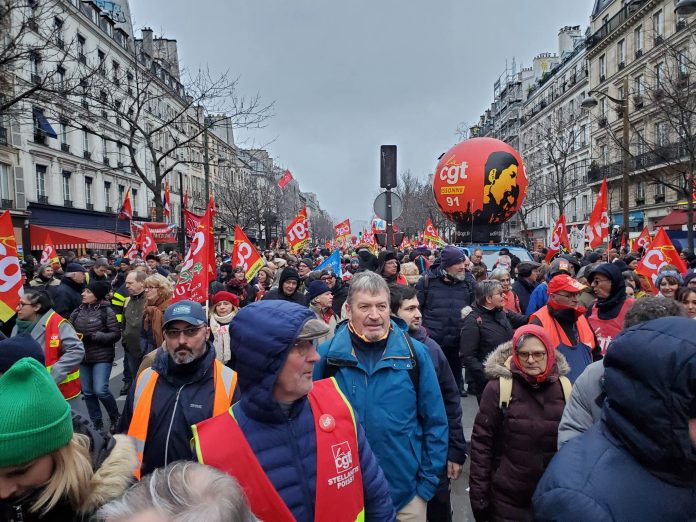Cécile Rimboud, Gauche Révolutionnaire (CWI France)
19 January was a huge day of mobilisation in France against plans to raise the retirement age to 64. Close to two million people demonstrated and took strike action across the whole country. In Paris, several metro lines were ‘striked shut’, and the unions had organised dozens and dozens of coaches to carry striking workers to the 300,000-strong demo. The streets were so packed that the demo had to be split into two boulevards. There were also 140,000 in Marseille, 50,000 in Toulouse and St-Etienne, 25,000 in Orléans, and 20,000 in Rennes, Brittany.
Many people liked our placard: ‘Macron out!’ In Nancy, Lorraine, 13,000 turned out. It was the biggest demonstration there in a very long time (bigger than the one on 5 December 2019, which had kicked off the previous successful battle against President Macron on pensions).
In Rouen, Normandy, a big demonstration of 18,000 people was very imposing. Slogans said “no to the reform”, but also “back to retirement at 60”, and for “a good pension”.
There was much discussion about everyone’s personal situation and the importance of the demonstration, which gave everyone confidence. No one expected such a large strike.
In Montélimar, Drôme, we heard: “6,000 in Montélimar, compared to cities like Paris it’s very small, but it’s historic for this city!”
Many smaller cities, like Gap in the Alps, had several thousand demonstrators in a mobilisation on a scale not seen for a long time.
And the vast majority of the population are supportive of the strike, (two thirds, according to one poll), which indicates even larger numbers of workers may yet join the struggle if they can see that it will effectively challenge Macron and his pro-capitalist policies.
Young people
It is the same with young people, who also participated in demonstrations but in smaller numbers. Before the strike, while leafleting and talking to young people, we found that they were very sympathetic to the mobilisation but did not see yet the point in joining the struggle themselves. Many see the issue of pensions as a very far off subject.
We have been discussing how they needed to fight along the workers for their own conditions and a future. With demonstrations as powerful as this, and 75% of 18-24 years old supporting the strike, there is no doubt that bigger numbers of young people will be electrified, and will consider joining the next demonstrations. This could bring new waves of energy to further strengthen the struggle.
Many workers, both from public and private sectors, were on strike. Rail traffic was very disrupted throughout the country. The strike was very well attended by energy workers at EDF – electricity production dropped by 7,000 megawatts and the CGT-Énergie union announced that it would cut off the electricity to any MPs who voted for the reform!
One in four workers were on strike in the public sector, education had a 40% strike rate. In the private sector, some big companies were out: car manufacturers Renault and PSA, in the metal industry, dockers in the ports, workers in retail companies like Carrefour and Darty, glass workers, cement workers, construction workers, ‘sans-papiers’ (undocumented) precarious workers… too many to name!
The strike had been called barely a week before, which left little time to prepare for it and organise general assemblies in the workplaces and study places. Many workers then went on strike and came to the demonstration in small groups, not organised in a workplace contingent but with their trade union federation. We spoke to workers who told us they had gone on strike, just two or three of them in their workplace, without even having talked to a trade union rep.
So, why was this protest so important? It is important to note, first and foremost, that all trade union federations are opposed to Macron’s project, and this brings a sentiment of strength and unity.
But is also because the issue of pensions in particular is very important. It affects the very functioning of society. The vast majority in France refuse an ‘every one for themselves’ approach to health, unemployment, retirement, and public services in general, and want to keep a pension system based on inter-generation solidarity. We want a society based on solidarity, where everyone has a quality job and where older workers can enjoy life without working, from 55 years old for jobs that are labour intensive, and 60 years old maximum for all. It is because this is such a fundamental question that the mobilisation was so massive, but not the only reason. The new pension reform, once again, was the very big straw that broke the camel’s back.
It came in the context of many strikes taking place in various sectors for pay increases. As we underlined in our leaflet: “They are being successful, such as at the SNCF (railway) or GRDF (gas company), which have obtained 200 euros a month, for all. There have also been successes at many small companies in the private sector which have demanded wages to at least match the level of inflation.”
This mass mobilisation was very clearly a reflection of the degree of anger and frustration that exists in the working class and the general population. This is why, along with demands on pensions, we had demands on wages, funding for the public sector (the striking firefighters’ contingent received applause from other demonstrators in Paris), and for better jobs.
As we have been putting forward, what is needed is to build a determined, mass struggle against Macron and the capitalists.
La France Insoumise, left-wing leader Mélenchon’s movement, and other organisations (some trade unions but not the main confederations) are calling for a national demonstration in Paris against the pension reform. We will, of course, participate in it and discuss these demands and tactics to build the mass strike which is needed to defeat Macron.
See socialistworld.net for updates








